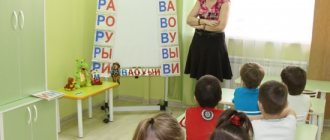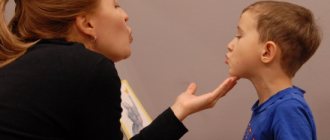The opportunity to work with children, in a quiet and comfortable office, with a stable, albeit small, salary - often speech therapists come into the profession with precisely these goals. But idealization at the start of your career can lead to disappointment in the future. Not everyone should choose this profession, says speech therapist teacher Vita Bilukha . Only by vocation and only to people whose desire to help others prevails over all others.
What features of the profession do young specialists learn about when starting their first job? What are the pros and cons? How much can you earn in the public and private sectors? And where to study to become a speech therapist after grades 9 and 11? We answer these questions in the FAN .
photo from the personal archive of Vita Bilukha /
What does a speech therapist do?
It is believed that specialists work only on sound pronunciation, that is, they teach children to pronounce sounds correctly, not to “lisp” or “burr.” In fact, the sphere of competence of a speech therapist is much broader, as is the concept of speech disorders. These include problems with speaking, reading and writing, voice disorders, stuttering, delayed speech development or its complete absence.
Each of these disorders has a reason, and the speech therapist’s task is to identify it. Speech is like a litmus test for human health, not only physical, but also mental. Its disorders may be associated with problems with hearing or the speech apparatus, or may result from more serious illnesses: mental, neurological. To assess what exactly caused the speech defect, a specialist must have a huge knowledge base in the field of anatomy, physiology, neurology, and psychology. Therefore, it is no coincidence that speech therapy is called a science at the intersection of medicine and pedagogy.
“A speech therapist helps develop literate speech,” explains speech therapist Vita Bilukha, “this means the formation and modification of words, the creation of grammatical structures. Helps develop coherent speech: the ability to correctly express one’s thoughts, compose stories from pictures, and retell texts. The specialist works on the child’s fine motor skills by performing a finger massage or inviting the child to play finger games. Teaches reading and literacy, diction and intonation, melody and tempo of speaking. Helps develop hearing and speech perception.”
Most often, specialists work with children - in kindergartens, schools, boarding schools, and clinics. But it is a mistake to consider a speech therapist exclusively a children's specialist. Even an adult can turn to a professional to eliminate speech defects. And they will help him too: you can make your speech beautiful, clear and coherent at any age.
A separate category of speech therapists is people after strokes. Speech restoration becomes one of the stages of rehabilitation and a way to return to a full life.
There must be time for passion
– “Speech therapy” children require more attention. Are there any mugs worth donating to? How then can you find time for your child to just play and be idle?
– We said that in the elementary grades you need to learn three basic functions: reading, writing and counting. It’s not Moscow studies to study biology, but precisely this. And we must definitely develop some kind of interest, which, perhaps, will help in life, and maybe become a start to choosing a profession. We are all interested in something.
Primary school is the period when a child should try. For example, he went karting. What boy doesn't want to go karting: there are cars there. But I came across a teacher who only forces these karts to be cleaned and polished. And that's it, the desire is gone. Well, okay, we don’t want that, now we want to go to another circle.
We came to fight. It’s the same thing there: adults fight, and everyone else watches. And again you can search. You need to find a specialist who will interest you, make you fall in love, let you roll over, and hit the punching bag. This is also a difficult search. It is difficult to find any specialist. Have to search.
I am for the child to have a hobby. And time should be allocated for it. Or then, no hobbies at all, just school. But I don't like it that way.
And so that you have enough time for everything and still have time to rest, a schedule can help. It's just compiled incorrectly. Children love it when it is very beautiful. They attached adhesive tape to cardboard, photographed the child himself: here he is reading, here he is writing, here he is counting, here he is eating, and they lined up his entire daily routine on this adhesive tape. I did it and peeled it off. He is comfortable, he has time for everything. He makes it in time. He lives in such a good rhythm. And then look, if the load is heavy, then something will need to be changed, removed.
Speech therapist work in kindergarten and school
“Every year the percentage of children who need speech therapy help is growing,” the expert notes. “And the later the defect is discovered, the more serious negative consequences it can have for the child’s development. Therefore, the task of a specialist working in a kindergarten is to promptly identify and prevent speech disorders in children of senior preschool age.”
In kindergartens, specialists are responsible for the development of coherent speech skills in children and the complete formation of its sound side. In other words, they teach children to hear and perceive sounds correctly, and then reproduce them correctly. They work with children individually and in groups.
In ordinary kindergartens, attention is paid only to those children who require professional help. And in specialized institutions and groups with a speech therapy focus, they are responsible for the entire educational process, building it in such a way as to help children get rid of speech problems as early as possible.
Be sure to involve parents in the work, provide consultation, and recommend correction techniques that can be used at home. If the speech therapist believes that the cause of the defect is a disease, he will recommend that the parents show the baby to a doctor - a specialized specialist. This approach helps eliminate the disorder at an early age or minimize its negative impact on the child’s development and speech.
Specialty "teacher-speech therapist"
In schools with children who are not doing well with speech, speech therapists work. Their task does not change, but it becomes more important. If a child does not perceive sounds correctly, he will usually have problems with literacy and writing. It is more difficult for him to study, remember material, and concentrate on the teacher’s words. Without correctional support, the school curriculum becomes an insurmountable obstacle for him, so it is imperative to correct violations with the help of a specialist.
“The tasks of a speech therapist at school are to promptly identify and correct speech disorders in students,” explains Vita Bilukha. “This helps to overcome difficulties that a child may have during the learning process.”
pixabay.com/
Specialty "defectologist-speech therapist"
Among speech therapists, there is a separate group of professionals who work with “special” children: toddlers and schoolchildren with intellectual disabilities. Such specialists are called defectologists: their qualifications allow them to correct defects in speech, writing, and communication skills in children with disabilities in physical and mental development.
Parents of children who have hearing and vision problems, developmental delays, memory and attention disorders, autism and cerebral palsy, and mental retardation turn to such specialists. A defectologist, of course, is not able to rid a child of the cause of the disease, however, thanks to correctional assistance, it is possible to improve the speaking and pronunciation skills of “special” children and help them communicate with loved ones and peers.
In his work, a defectologist closely interacts with doctors who “manage” the child: a pediatrician, a neuropsychiatrist. In specialized institutions, a defectologist, psychologist, and social teacher work with children at the same time. The tasks of specialists vary, but they have the same goal - to improve the quality of life of the patient under their care.
In recent years, the quality of education at school has noticeably decreased, especially in Russian language and literature. A sixth grader reading syllables is not uncommon. Children do not like to read and do not want to. By the end of school, only a third of them can thoughtfully read a text and extract useful information from it, speak and write correctly, and master the norms of the language. More than half of graduates cannot express their thoughts consistently and competently.
As many years of study have shown, one of the reasons for children’s underachievement in the Russian language and in mathematics and other subjects is insufficient development of oral speech, which prevents them from mastering correct reading and literate writing. By the age of five, a child should normally master the entire structure of language, that is, the sound and semantic aspects. This means that the child speaks clearly, competently, distinguishes speech sounds, and has a sufficient vocabulary. Competent speech is an indicator of a child’s mental development. At the age of six or seven, speech develops very rapidly.
SPEECH DEVELOPMENT GOES IN TWO DIRECTIONS:
- the vocabulary is intensively developing and the morphological system of the language spoken by others is being acquired;
- speech ensures the restructuring of cognitive processes (attention, perception, memory, grammatical structure of speech, as well as thinking).
At the same time, the expansion of the vocabulary, the development of the grammatical structure of speech and cognitive processes directly depend on living conditions and upbringing. Therefore, at this age it is very important to organize classes on speech development, especially for children who have speech impairment. Such classes are conducted at school by a speech therapist.
Speech therapy translated from Greek means “education of correct speech.” The subject of speech therapy as a science is speech disorders and the education of persons with speech disorders. The object of study is a person. Like all sciences that study humans, speech therapy is a synthetic science. A speech therapist teacher is a teacher who must have knowledge related to special branches of pedagogy (typhlopedagogy, deaf pedagogy, oligophrenopedagogy), methods of teaching the native language and mathematics, general and special psychology, neuropsychology, neuro- and psycholinguistics and other sciences. In order to successfully engage in the correction and prevention of speech disorders, to comprehensively influence the individual, it is necessary to know the symptoms of speech disorders, their etiology, mechanisms, the ratio of speech and non-speech symptoms in the structure of speech disorders.
At school, the speech therapist teacher is an expert in academic performance in the native language. He identifies children with deficiencies in oral and written speech and organizes classes to prepare the prerequisites for the child’s full teacher education. In his classes, a speech therapist teacher solves not only speech problems themselves, but also shapes the educational activities of children. If in preschool age the child’s main activity is play, then at school he should be engaged in educational activities. According to M. Bezrukikh, 78% of 6-year-old children are not ready for school, and for 7-year-olds - 20-30%. According to the results of observations of first-graders at our school, all 7 children who were under 6.5 years old on September 1 had psychological problems: 5 are disinhibited, 1 often cries, 1 is withdrawn and touchy, 1 cannot remember letters, 1 has bouts of vomiting.
Modern psychological and pedagogical research indicates that one of the most important aspects of psychological readiness for school is a certain, sufficient level of voluntary or volitional development of the child. It is also known that the transformation of involuntary functions and processes into voluntary ones turns out to be the main line in the psychological mechanism of development of the child’s personality.
Even in gifted children, a fairly high level of development of cognitive processes and speech and imagination is combined with insufficient development of volition. This is recorded both among children entering school and among students in grades 2-3. An insufficient level of arbitrariness is manifested in the peculiarities of the design of written work (dirt in the notebook, inability to apply pressure to the pen, a very slow pace of writing) and in the presence of special errors that are neither spelling nor dysgraphic, typical for children with speech impediments:
When writing
1) replacing letters (k-p); 2) copying with errors from the board; 3) cannot retain and reproduce elements of speech (sounds, words, sentences); 4) hand tremor when writing; 5) the appearance or increase of errors towards the end of the work; 6) difficulties in mastering the alphabet; 7) lack of spelling vigilance.
While reading:
1) repeated reading of a line, skipping a line, reading a line located above; 2) loss of a line when reading; 3) reading with errors; 4) low reading speed; 5) poor memorization; 6) does not know how to highlight the main thing in what he read.
Mathematics:
1) arithmetic error; 2) inability to solve problems. In modern conditions of preschool education, the formation of true arbitrariness is difficult. In children's institutions, the development of voluntary attention is carried out according to the external type, when the goals and objectives of any activity are set by adults, and the child is required to obey norms and rules. True arbitrariness lies in the fact that the child must “master his own behavior, treating himself as if from the outside, viewing himself as a certain object” (Vygotsky). “Speech helps him master this object” (Vygotsky).
At early and primary school age, the word follows the action and records the result. At the next stage of development, speech accompanies action. Then the speech moves to the foreground. The child verbally defines a task for himself and thus regulates and plans his behavior. A 5-6 year old child can practically control his behavior, subordinate his actions to the expectations of the people around him, achieve his goals, overcome difficulties, but at the same time he is easily distracted from his intentions by any circumstance that is attractive to him.
A first grader must be able to separate the main from the secondary and consciously organize his behavior so as not to be distracted from the main thing.
Thus, in order to prepare a child for full-fledged educational activities and to form a creative personality, it is necessary to develop in the child voluntary activity and voluntary behavior, communication, which help children quickly adapt to the student environment and acquire the skill of learning. This can be done on the basis of speech development in speech therapy classes. The size of speech therapy groups (3-6 people) allows for an individual approach to solving the educational problems of each child.
A speech therapist can conduct a detailed examination of the child and identify the reasons for his failure in school. He has the necessary arsenal of tools to help the child, and will be able to give specific advice on teaching each child to his teachers and parents. The examination of first-graders is carried out in early September. Based on the results of an examination of children by a speech therapist and taking into account the recommendations of a neurologist and a speech therapist at the clinic, children are enrolled in speech therapy groups. Children who attended speech therapy kindergartens continue their education at the school speech center, since it is known that general speech underdevelopment is compensated only by the age of 10.
It is important to pay attention to the child’s problems as early as possible. It would be useful to conduct a screening examination of children when enrolling them in school and give parents recommendations on development and upbringing even before entering 1st grade. Many school difficulties can be avoided if parents pay attention in time to the behavior, level of development of thinking and speech in their child. The prognosis for the further development of children with speech impediments is rather favorable, provided that timely, targeted assistance is provided. For example, children who have a reading delay before the age of 10 will most likely not be able to catch up with their peers by the time they leave school without special help. Or maybe they will lag behind. Both parents and teachers must understand that the child himself will not be able to cope with such problems; he needs qualified help from specialists. At school, such a specialist is a speech therapist.
Features, pros and cons of the profession of speech therapist
“In their work, a specialist needs to show great patience and restraint,” notes teacher-speech therapist Vita Bilukha. — It is important to have goodwill, communication skills, and intuition. Observation and perseverance, flexibility of mind are required. After all, often the presentation of material has to be rearranged on the fly: you expect one thing, but have to work with another.”
One of the main difficulties of the profession is the need to work with “difficult” children. Without a sincere desire to help, to go through a long path of correction step by step, patience - it is very difficult to cope with the psychological load. Another significant disadvantage is the huge number of documents that a specialist must maintain when working in a budget institution. They either get used to this or go into private practice, where the specialist determines the scope of reporting for himself.
How many hours does a speech therapist work?
The standard work rate in a budget institution is 20 hours a week, that is, a speech therapist works 4 hours a day. This is one of the advantages of the profession: such a schedule allows you not to get tired or overloaded. There is always time left for personal matters, and if you wish, you can engage in private practice in your free time.
How long is a speech therapist's vacation?
Long vacations are another plus of the profession. Its duration is 56 days. And since specialists work in schools or kindergartens, where the educational process lasts from September to May, vacations always fall only in the summer months, which is also convenient.
pixabay.com/
How much does a speech therapist earn?
The salary level does not differ from the usual in the public sector. Depending on the region and place of work, a specialist can count on 17–20 thousand rubles per month. The average salary of a speech therapist in a school is usually higher than in a kindergarten.
“A speech therapist has no career growth as such,” clarifies Vita Bilukha. “But now more and more specialists are going into private practice. Those who have self-discipline and organizational character can achieve good results. In this case, the specialist himself sets the hourly wage.”
According to the expert, only those who like to feel the usefulness of their work and who want to help people become healthier and happier can successfully realize themselves in the profession. And only in second place in importance should come short working hours and long vacations. In this case, the person will enjoy his work.
The child needs to be given an exemption, like from physical education.
– It turns out that a child with speech therapy problems at school is in a state of stress. Stress at school, because things don’t work out, and the teacher doesn’t always understand why. In addition to schoolwork, classes with a speech therapist, and sometimes a neurologist gives some exercises.
– Mechanisms to support such a child exist. Let me draw a parallel. For example, a child breaks his leg and is exempt from physical education. After all, no one invites him to classes and gives him two grades for failing to pass the standards. But for some reason, speech therapy errors and learning difficulties are not interpreted as a disorder or pathology that requires, in some sense, leniency. It is necessary for the teacher to show not only tolerance, but simply universal wisdom.
So a student came to class, and he was beautiful in himself. And there is nothing unusual about it. Just like everyone else. But he developed a problem in the form of a writing disorder, dysgraphia, because before school he was a “speech” child, or did not keep up with the general pace of development, or did not fit within the allotted framework for mastering writing.
Why shouldn't he just temporarily count all these errors as one? Or don’t count them as mistakes at all. Give exemption, like from physical education. He still goes to classes, studies, studies. And don’t say all the time: “As long as I tolerate you, and the time will come, I will punish you if you don’t improve!” If we undertake to help, then we must help to the end.
In the end, we write, read, count in order to receive information, and not in order to say: an error, not an error. Therefore, the child needs to be helped. And for each, any minimal personal success, praise him.
A boy taught me who said: “The teacher will never see what I am capable of, because he is used to me always making mistakes. I work with you, and everything works out for me.” I suggested to my mother: “Ask this teacher for additional lessons, so that he will finally look at the child more closely, not against the background of his overall performance, but his personal successes.” After additional classes, the teacher said: “It turns out you’re not a fool!”
– What is dangerous to miss in elementary school? What is important not to miss?
– In primary school you only need three skills: reading, writing and counting. Dot. Nothing else. And you need a good teacher to teach this. Because if the teacher is difficult, she creates fear and reluctance to learn for the entire subsequent period. You have to like the teacher.
The teacher must influence the microclimate in the classroom so that the children feel comfortable.
All parents strive to ensure that the teacher is the strongest, the smartest. When parents choose a school for a child, they need to pay attention not only to whether the teacher is “strong” or not, but also to whether she is suitable for the child. In general, absolutely everyone remembers GOOD people and good teachers; moral things are instilled by good people. How demanding is the teacher, is she ready to differentiate the child? The child is assessed from early childhood, but at school this reaches its climax.
I can look at this situation as if from the outside, because when I worked as a school speech therapist, I saw how children are drawn to those teachers who know how to share and can resolve a difficult situation in a game.
All children love the young and beautiful, and those whom you can take by the hand and walk with her in pairs to the dining room, without fear that she will shout “get into line.” And everyone is fighting for this hand.
And maybe this teacher is not the most titled, but she can calmly explain the material and give adequate grades. And in the classroom there is a normal, healthy environment.
Many people say that modern children are cruel. Of course, there will be cruel ones if the teacher starts shouting: “You should have taught mathematics a long time ago instead of running, training your legs somewhere.” Well, who will like it? If, on the contrary, they say about a child: “Guys, look what a boy he is. And here he knows how to draw,” the child will open up to him. It’s all very easy to organize and find and highlight each student’s strengths and abilities.
I always relied on hooligans. If you attract them to you, the microclimate will be formed correctly. I have always liked extraordinary children, and it doesn’t matter whether they had special needs or not. You meet different children in practice: a rebus child to whom you need to find the key, or a loser child who attracts problems like a magnet, finds himself in absurd situations, or such a “prickly hedgehog”, everyone has already offended him, he defends himself.
You see that the child requires your attention, he needs support, praise, an interesting assignment, and it’s not even a matter of dysgraphia, but simply if you support the person, everything goes differently, a different emotional mood.








